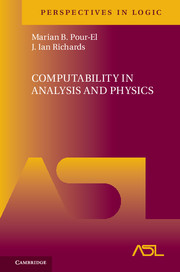Book contents
- Frontmatter
- Preface to the Series Perspectives in Mathematical Logic
- Authors' Preface
- Contents
- Maps
- Introduction
- Prerequisites from Logic and Analysis
- Part I Computability in Classical Analysis
- Part II The Computability Theory of Banach Spaces
- Part III The Computability Theory of Eigenvalues and Eigenvectors
- Addendum: Open Problems
- Bibliography
- Subject Index
Authors' Preface
Published online by Cambridge University Press: 24 March 2017
- Frontmatter
- Preface to the Series Perspectives in Mathematical Logic
- Authors' Preface
- Contents
- Maps
- Introduction
- Prerequisites from Logic and Analysis
- Part I Computability in Classical Analysis
- Part II The Computability Theory of Banach Spaces
- Part III The Computability Theory of Eigenvalues and Eigenvectors
- Addendum: Open Problems
- Bibliography
- Subject Index
Summary
This book is concerned with the computability or noncomputability of standard processes in analysis and physics.
Part I is introductory. It provides the basic prerequisites for reading research papers in computable analysis (at least when the reasoning is classical). The core of the book is contained in Parts II and III. Great care has been taken to motivate the material adequately. In this regard, the introduction to the book and the introductions to the chapters play a major role. We suggest that the reader who wishes to skim begin with the introduction to the book and then read the introductions to Chapters 2, 3, and 4—with a brief glance at the introductions to Chapters 0 and 1.
The book is written for a mixed audience. Although it is intended primarily for logicians and analysts, it should be of interest to physicists and computer scientists— in fact to graduate students in any of these fields. The work is self-contained. Beyond the section on Prerequisites in Logic and Analysis, no further background is necessary. The reasoning used is classical—i.e. in the tradition of classical mathematics. Thus it is not intuitionist or constructivist in the sense of Brouwer or Bishop.
It is a pleasure to thank our mathematical colleagues for stimulating conversations as well as helpful comments and suggestions: Professors Oliver Aberth, John Baldwin, William Craig, Solomon Feferman, Alexander Kechris, Manuel Lerman, Saunders MacLane, Yiannis Moschovakis, Jack Silver, Dana Scott and Pat Suppes. Thanks are also due to Professor Yoshi Oono of the Department of Physics of the University of Illinois in Urbana, who, together with some of his colleagues, went through the manuscript in a seminar and commented extensively on questions of interest to physicists.
The Mathematical Sciences Research Institute at Berkeley provided hospitality and support to one of the authors (M.B.P.) during the fall of 1985.
Kate Houser did a superb job of typing the manuscript.
Finally, we wish to thank Professor Gert Muller and Springer-Verlag for their help above and beyond the call of duty.
We hope that this short monograph will provide an easy entrance into research in this area.
- Type
- Chapter
- Information
- Computability in Analysis and Physics , pp. vii - viiiPublisher: Cambridge University PressPrint publication year: 2017

